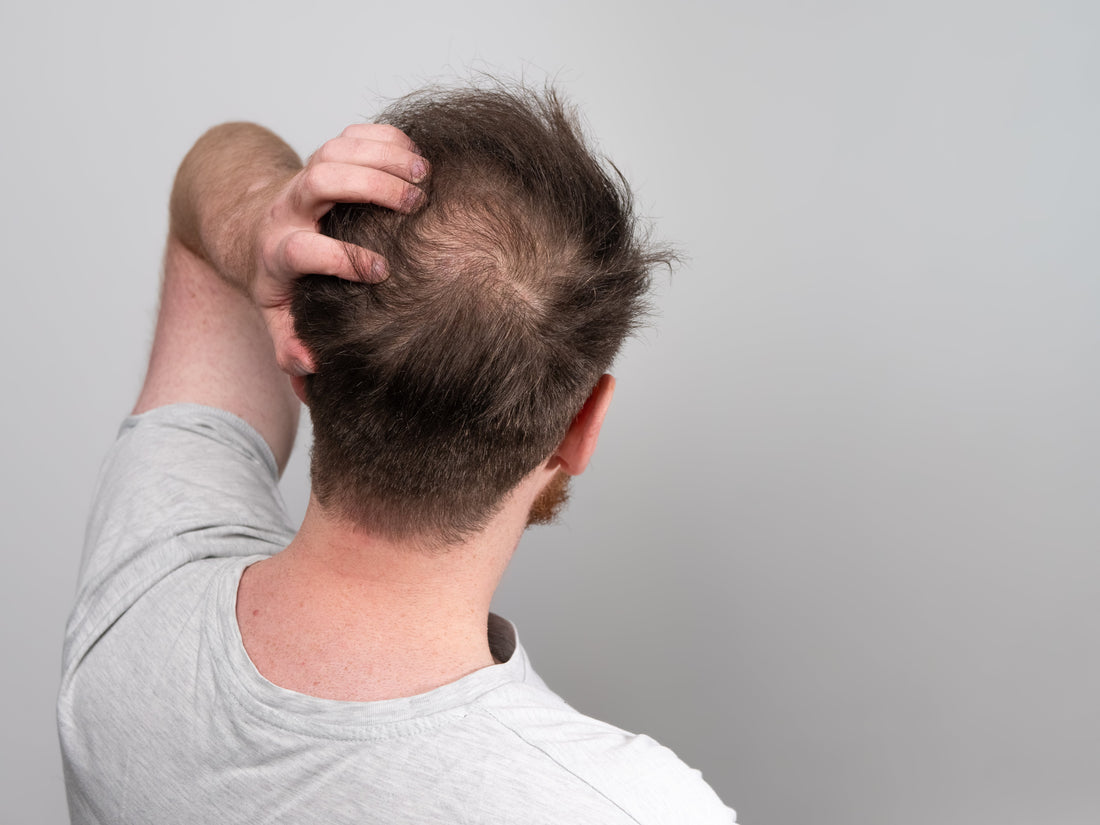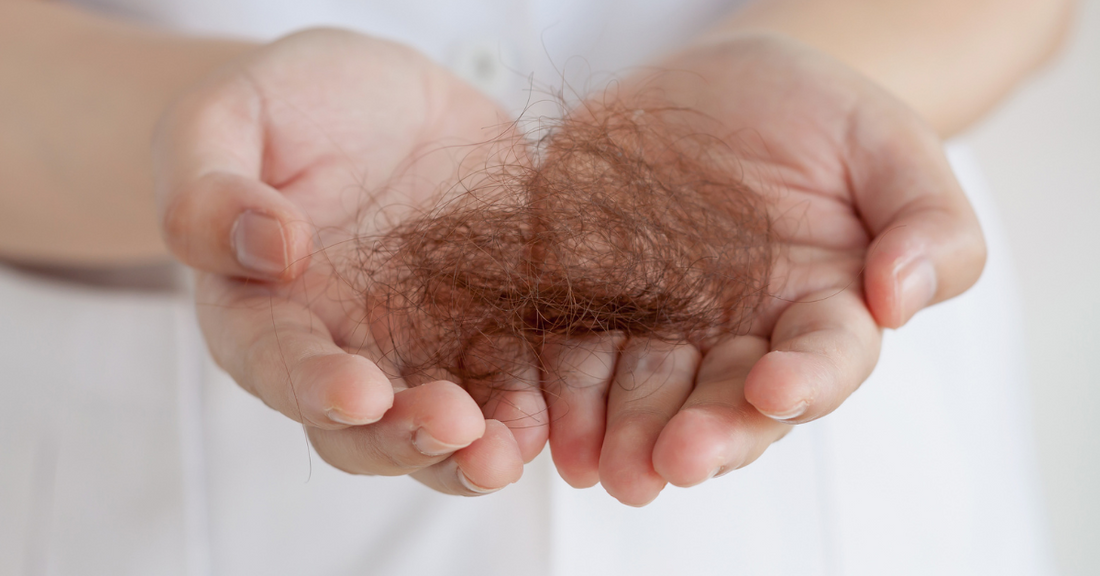Hair loss is a condition that impacts hundreds of millions of men and women every day. It can cause frustration and embarrassment to a great degree. It can hurt one’s confidence, and it can cause problems in other aspects of your life. For many men, as well as women, simply accepting hair loss or thinning is not an option.
While approximately 95% of hair loss or thinning experienced by men and women is caused by genetics, there are rare instances in which it may be triggered by another cause. Regardless of the presumed cause, excess hair loss or thinning warrants a consultation with a physician.
Below are some examples of causes of hair loss and thinning unrelated to genetics. The good news is, like male and female pattern hair loss, with proper intervention, the triggers for these causes can likewise be addressed and resolved, allowing you to regrow the hair that has been lost.
The Normal Hair Cycle
Hair implicates three stages: anagen, the active growing stage; catagen, the resting stage; and telogen, the stage when a new hair pushes the old one out and you lose it in your hairbrush or the shower.
It is common to lose approximately 100 hairs per day, but what happens when you start losing more than you expected, even by the handful? Or, the hair loss does not follow a pattern commonly associated with genetics? Not only can it induce panic, it should raise questions about why your hair is falling out at such an alarming rate.
While hair loss is frequently caused by genetics, this is not always the case. In other words, if you know genetics aren’t to blame for losing your hair, but you still don’t know the actual reason, your best bet is going to be to visit a physician. At the same time, before you take such an essential step, there are things you can do on your own.
Beyond Genetics, What Causes Hair Loss?
To be clear, your hair loss is certainly being caused by something. Genetics is frequently the culprit, but it is important to understand that this is not always going to be the case. There are numerous reasons for hair loss that should be kept in mind. You will want to make an effort to get answers to the question as soon as possible.
In some situations, hair loss can be an underlying cause of something far more serious. In addition to genetics, hair loss can, occasionally, arise from lifestyle, nutrition, disease, hormone shifts, and emotional stress; in many cases, it's a combination of these factors. This is why hair loss is always something that should be discussed with a healthcare professional.
Disease And Illness Can Cause Hair Loss
Disease/illness is right at the top of our list of hair loss causes for a reason. It is one of the biggest reasons for hair loss that doesn’t directly involve your genetics. Not only can certain medical conditions cause your hair to fall out, but the treatments and medications for certain conditions can also lead to losing your hair.
Many individuals experience this hair loss approximately three to four months after a major surgery, or after dealing with the effects/treatments of a major illness. While this type of hair loss can be frustrating, it is important to remember that it is also generally temporary. It is often the result of the stress brought about by the treatment.
Hair loss can also be caused by a previously-unknown disease. Autoimmune conditions such as Lupus, cardiovascular issues and diabetes are medical conditions that can include hair loss among their symptoms. Skin conditions like lichen planus or seborrheic dermatitis also can cause thinning of the hair.
If you are losing your hair, and you haven’t had a major surgery or illness in recent weeks, you should make an appointment to see your doctor as soon as possible. However, you should not assume you have one of these diseases if you're experiencing hair loss, but you may want to have a work-up with your health care provider if your hair loss increases suddenly.
Hormonal Alterations/Changes
Hormonal issues is yet another potential cause for hair loss that does not have a thing to do with genetics. If male or female hormones are out of whack, one of the major consequences can be losing your hair. It is also possible to have an overactive or underactive thyroid. Thyroid disease also frequently includes some form of hair loss.
Thankfully, this is another hair loss problem that is easy enough to solve. If you can treat the thyroid condition, then you should be able to deal with your hair loss. There are also obviously things you can do to speed up the process of having your hair restored.
Simply Getting Older
Getting older can represent a remarkable transition from one stage of your life to the other. At the same time, getting older can also cause a number of problems. The list is a long one, and you can certainly losing your hair somewhere on it. Forty-percent of all men have noticeable hair loss by the age of thirty-five. By the age of sixty, the number climbs all the way to sixty-five percent. These are not figures one should ignore.
Although aging is necessary for androgenetic alopecia to occur, it is possible for aging to simply diminish our production of hormones to the point of not being able to grow new hair properly.
Poor Hair Care
It is amazing sometimes to think about all of the different things we do to our hair. Many people dye their hair. Many people choose to bleach their hair. Then you have certain hairstyles, such as pigtails. All of these things can cause problems with your hair over time. The chemicals involved in any hair-alteration endeavor are often damaging to the follicles. Eventually, without proper treatment, poor hair treatment can cause the hairs to fall out or break off.
Even excessive hair styling can cause damage to your hair over time. Too many salon trips can pull too tightly too often on your hair. The end result can be devastating as you get older. As long as these behaviors are changed before the scalp begins to scar, you should be able to grow the hair back without any problems. Unfortunately, if scarring occurs, it can lead to permanently losing your hair in that area.
Poor Nutrition
Not taking your nutrition seriously can naturally lead to a wide range of problems. The list can include hair loss on a dramatic level. Studies strongly suggest that if we aren’t getting enough iron or protein in our diet, it can be difficult for our hair and scalp to remain healthy.
A healthy, balanced diet is critical to all human systems, including your hair, so unexpected hair loss can be a clue that something is missing from your diet—it's the first and least invasive place to start looking for clues. Vitamins, proteins, minerals, and fats all play a role in hair, contributing at different stages along the way.
Some of the main nutritional requirements for healthy hair are these: protein, B vitamins (especially B-12 and B-7, also called biotin), vitamin C, iron, vitamin A, and zinc. Specifically, regular consumption of foods like oysters, fish, spinach, pumpkin seeds, tofu, quinoa, beans, walnuts, eggs, yogurt, and lentils can support lustrous locks and healthy.
Malnutrition can also create a lot of problems with hair loss. This is where those fad/crash diets can come into play. If you are on a diet in which you are looking to lose a good deal of weight over a short period of time, or if your diet involves dramatically eliminating most of the things you can eat, malnutrition can occur. Beyond dizziness, anxiety, and other consequences, malnutrition is believed to be a possible cause of hair loss in both men and women.
Stress
Another major cause of hair loss? Stress.
Suffice to say, we are just too stressed out in our daily lives. While hair loss caused by genetics still impacts the majority of those who are experiencing hair loss, the truth of the matter is that more people are losing their hair for other reasons than ever before. Stress is one of the biggest causes. It can be stress brought about through the reasons mentioned above, but it is also well within the realm of possibility that simply being stressed to the extreme can cause your hair to fall out.
We are constantly dealing with the stress of daily life. Our work, our friends, our family, the news, and just about everything else seems to be causing more stress than we can handle. This stress can cause us to eat poorly, or not eat at all. It can cause headaches, exhaustion, nausea, and other issues. Without question, it can also contribute to dramatic hair loss.
Stress can cause hair loss in myriad ways. An acute traumatic event—the loss of a loved one, severe systemic illness, even the joyous "shock" of childbirth—can cause a mass exodus of hair from your head two to three months later. This situation is called telogen effluvium and results in hair coming out in clumps or handfuls, an especially unnerving situation.
In most cases, telogen effluvium will resolve with time and attention to supporting the health of the hair. Thankfully, this is another type of hair loss that can be treated.
Treating Your Hair Loss
For all of the issues mentioned above, it is important to realize that you have solutions. The important thing is to figure out which solutions are going to be your best choices. This is once again where the value of seeing a trusted medical professional is clear. Only your doctor can ultimately determine why your hair is falling out in the first place. Once they can do this, they can help you to figure out a viable solution. A doctor can also find a more serious problem, if that is indeed the case in your situation.
Nonetheless, hair loss is not something you should have to settle for. If your hair loss continues to bother you, consider doing something about it!







